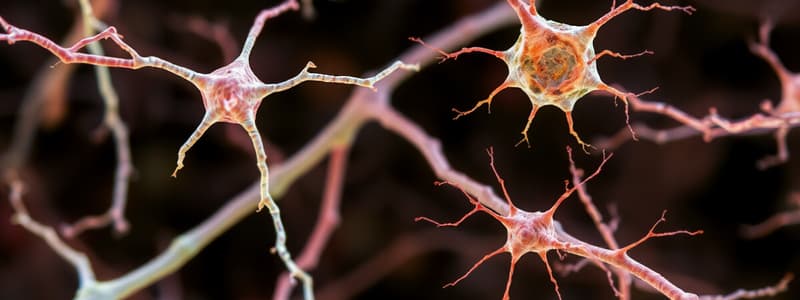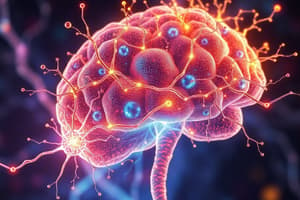Podcast
Questions and Answers
What type of neuron has a single axon?
What type of neuron has a single axon?
- Bipolar neuron
- Unipolar neuron (correct)
- Multipolar neuron
- Neuroglia
Which type of synapse involves direct communication between the axon of one neuron and the cell body of another?
Which type of synapse involves direct communication between the axon of one neuron and the cell body of another?
- Axoaxonic
- Axosomatic (correct)
- Axodendritic
- Dendroaxonic
Which of the following is NOT a type of neuroglia in the CNS?
Which of the following is NOT a type of neuroglia in the CNS?
- Astrocytes
- Oligodendrocytes
- Microglia
- Schwann cells (correct)
What is the primary function of astrocytes in the nervous system?
What is the primary function of astrocytes in the nervous system?
What type of neuron features several dendrites and one axon?
What type of neuron features several dendrites and one axon?
Which type of synapse is characterized by a connection between the axon of one neuron and the dendrite of another?
Which type of synapse is characterized by a connection between the axon of one neuron and the dendrite of another?
Which of the following glial cells are responsible for forming the blood-brain barrier?
Which of the following glial cells are responsible for forming the blood-brain barrier?
Which component is characteristic of bipolar neurons?
Which component is characteristic of bipolar neurons?
What is the primary function of the cell body (soma) in the nervous system?
What is the primary function of the cell body (soma) in the nervous system?
Which component of the central nervous system is primarily responsible for processing information?
Which component of the central nervous system is primarily responsible for processing information?
Which structure is responsible for transmitting messages away from the neuron?
Which structure is responsible for transmitting messages away from the neuron?
What is the mass of the nervous system approximately?
What is the mass of the nervous system approximately?
Which part of the nervous system serves as the delivery network?
Which part of the nervous system serves as the delivery network?
What is the primary role of dendrites in a neuron?
What is the primary role of dendrites in a neuron?
Which statement correctly describes axons?
Which statement correctly describes axons?
What function does the axon terminal serve?
What function does the axon terminal serve?
How many pairs of cervical nerves are present in the human body?
How many pairs of cervical nerves are present in the human body?
What structure forms the crossbar of the H in the gray matter of the spinal cord?
What structure forms the crossbar of the H in the gray matter of the spinal cord?
What does the posterior median sulcus represent in relation to the spinal cord structure?
What does the posterior median sulcus represent in relation to the spinal cord structure?
Where is the central canal located within the spinal cord?
Where is the central canal located within the spinal cord?
What is the cauda equina commonly referred to as?
What is the cauda equina commonly referred to as?
What is the primary function of sensory input in the nervous system?
What is the primary function of sensory input in the nervous system?
Which structure is responsible for processing the information received from sensory inputs?
Which structure is responsible for processing the information received from sensory inputs?
What does the output phase of the nervous system involve?
What does the output phase of the nervous system involve?
How is sensory information transmitted to the brain and spinal cord?
How is sensory information transmitted to the brain and spinal cord?
What structure is located at the outer part of the spinal cord?
What structure is located at the outer part of the spinal cord?
Which statement about white matter in the spinal cord is true?
Which statement about white matter in the spinal cord is true?
What type of function does the integrative function in the nervous system primarily serve?
What type of function does the integrative function in the nervous system primarily serve?
Which component is responsible for motor output in the nervous system?
Which component is responsible for motor output in the nervous system?
What is the primary function of the anterior gray horn in the spinal cord?
What is the primary function of the anterior gray horn in the spinal cord?
Which of the following best describes the posterior gray horn?
Which of the following best describes the posterior gray horn?
What is the characteristic location of the lateral gray horn?
What is the characteristic location of the lateral gray horn?
Which of the following accurately describes 'nuclei' in the context of spinal cord anatomy?
Which of the following accurately describes 'nuclei' in the context of spinal cord anatomy?
What role does the anterior white commissure play in the spinal cord?
What role does the anterior white commissure play in the spinal cord?
Study Notes
Types of Neurons
- Unipolar: A single axon extending from the cell body.
- Bipolar: Has one dendrite and one axon.
- Multipolar: Several dendrites and one axon.
Neuroglia/Glial Cells
- CNS:
- Astrocytes: Support structure, maintain metabolic environment, regulate electrolyte balance, form the blood-brain barrier (BBB), and repair damaged tissue.
- Oligodendrocytes: Form myelin sheaths around axons in the CNS.
- Microglia: Remove cellular debris and pathogens, act as immune cells in the CNS.
- Ependymal cells: Line the ventricles of the brain and central canal of the spinal cord, produce cerebrospinal fluid.
- PNS:
- Schwann cells/Neurolemmocytes: Form myelin sheaths around axons in the PNS.
- Satellite cells: Surround neuron cell bodies in ganglia, provide support and regulate the microenvironment.
Synapses
- Communication between neurons: The transfer of information from the axon terminal of one neuron to the receptive region of another neuron.
- Types of Synapses:
- Axodendritic: Connection between the axon of one neuron and the dendrite of another.
- Axosomatic: Direct communication between the axon of one neuron and the cell body of another.
- Axoaxonic: Synapse made by one neuron onto the synapse of another neuron.
Organization of the Nervous System
- Nervous System: Two main subdivisions:
- Central Nervous System (CNS): Processing center, including the brain and spinal cord.
- Peripheral Nervous System (PNS): Delivery network, connecting the CNS to the rest of the body.
Anatomy of a Neuron
- Cell Body/Soma: Contains the organelles of a neuron, including the nucleus. Processes and interprets messages received and transmitted by the neuron. Found in gray matter.
- Dendrites: Receive stimuli and transmit them toward the cell body.
- Axon: Transmits messages away from the cell body, often longer than dendrites. Covered by a membrane called the axolemma.
- Axon Terminal: Most distal end of the axon, transfers impulses to another neuron or effector organ.
Sensory, Integrative, and Motor Functions
- Sensory Function: Detects stimuli and carries sensory information into the CNS through cranial and spinal nerves.
- Integrative Function: Processes and analyzes sensory information.
- Motor Function: Initiates motor responses to stimuli, activating effectors (muscles and glands) through cranial and spinal nerves, causing muscle contractions and gland secretions.
Cranial Nerves
- 12 pairs of cranial nerves, each with a specific function:
- Some carry sensory information, others carry motor commands, and some carry both.
Spinal Cord
- External Anatomy:
- Rough oval shape, flattened anteriorly and posteriorly.
- 31 pairs of spinal nerves: 8 cervical, 12 thoracic, 5 lumbar, 5 sacral, 1 coccygeal.
- Cauda equina: Roots of lower spinal nerves extending inferiorly from the spinal cord.
- Internal Anatomy:
- Anterior Median Fissure: Wide groove on the ventral side.
- Posterior Median Sulcus: Narrow furrow on the dorsal side.
- Gray Matter: Contains neuronal cell bodies, interneurons, and axons of sensory neurons. Forms the 'H-shaped' center of the spinal cord.
- Gray Commissure: Connects the two sides of the gray matter.
- Central Canal: Small space in the center of the gray commissure containing cerebrospinal fluid.
- Anterior White Commissure: Connects the white matter of the right and left sides of the spinal cord.
- Nuclei: Clusters of neuronal cell bodies within the gray matter.
- Horns: Subdivided regions of gray matter on each side of the spinal cord:
- Anterior Gray Horn: Contains somatic motor nuclei (cell bodies of motor neurons controlling skeletal muscle contractions).
- Posterior Gray Horn: Contains axons of sensory neurons and interneurons.
- Lateral Gray Horn: Present in the thoracic and upper lumbar segments, contains cell bodies of autonomic motor neurons.
- White Matter: Outer part of the spinal cord, contains myelinated axons.
Spinal Nerves
- Cervical Plexus: Innervates the neck, shoulders, and diaphragm.
- Brachial Plexus: Innervates the arms, hands, and chest.
- Lumbar Plexus: Innervates the lower back, abdomen, and legs.
- Sacral Plexus: Innervates the pelvic region, buttocks, and legs.
Studying That Suits You
Use AI to generate personalized quizzes and flashcards to suit your learning preferences.
Related Documents
Description
This quiz covers the various types of neurons including unipolar, bipolar, and multipolar neurons, as well as detailed descriptions of glial cells in the central and peripheral nervous systems. Test your understanding of their functions and how they support neural communication. Perfect for students in neuroscience courses.




